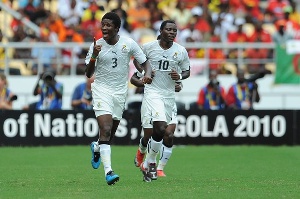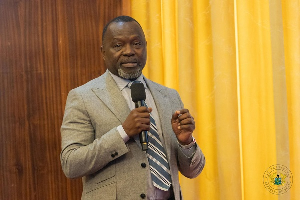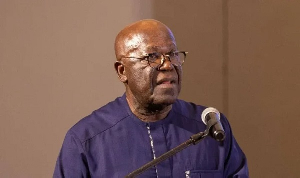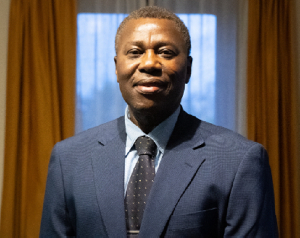In 1982, a 17-year-old African prodigy by the name of Abedi 'Pele' Ayew lifted the Nations Cup for Ghana - coming on as a sub as the Black Stars beat hosts Libya on penalties.
That was the West Africans' fourth Nations Cup and even in his most pessimistic moments, Pele surely never imagined it would be their last - with the 'African Maradona' sitting out Ghana's loss in the 1992 final through suspension.
So Pele will burst with emotion should his sons Andre ('Dede') and Ibrahim follow his famous footsteps against two-time defending champions Egypt in Sunday's final in Luanda.
Dede has already ensured parental pride in heaps, becoming the first African to hold aloft Fifa's U20 World Cup trophy after the Ghanaians beat Brazil in October's final.
And although he has blown hot and cold here in Angola, the winger, who turned 20 last month, epitomises this Ghana side for what a story it would be if this band of youngsters could win this tournament. For few gave them a chance after injuries to regulars Michael Essien, Stephen Appiah, John Mensah and John Paintsil (not to mention Sulley Muntari's ousting for indiscipline).
In response, Serb coach Milovan Rajevac - ably supported by his one-armed translator - has turned to youth, blooding five members (Dede, Samuel Inkoom, Emmanuel Agyemang-Badu, Opoku Agyemang and Dominic Adiyiah) of the U20 side.
And since no one fancied the Black Satellites to beat four-time champions Brazil in the World Cup, Sunday's clash of youth and experience will hold no fear for them.
The youngsters are also battling history for the Nations Cup winner in a World Cup year is seldom a side that's going on to face the world's best - with only Zaire/DR Congo (1974), Nigeria (1994) and Cameroon (2002) having managed that.
But this Ghanaian side, who play 4-4-2, are too young to care about records and also show composure way beyond their years, especially in central midfield where the baggy-shorted Kwadwo Asamoah, 21, has shone.
Standing in the Black Stars' way are surely the finest tournament team in the long history of the Nations Cup - Egypt.
The Pharaohs, who have won the competition six times (two more than their nearest rivals), are going for an unprecedented treble following their 2006 and 2008 successes.
It prompts a wry smile to remember that coach Hassan Shehata, the only coach to have won the Nations Cup back-to-back, was a largely-unpopular choice when he replaced Italian Marco Tardelli in 2004.
Like Rajevac, Shehata has also had injury problems (missing Mohamed Barakat, Mohamed Shawky and the inspirational Mohamed 'The Magician' Aboutreika) but overcome them in similarly-impressive style.
His team has been around for years and goalkeeper Essam El Hadary's celebrations, Wael Gomaa's distinct features, Hosny Abd Rabou's industry, Mohamed Zidan's buzz and Emad Moteab's goals will be familiar to those who only tune in to African football every two years.
The tournament's top scorer, supersub Mohamed Gedo, may be a new face, but captain Ahmed Hassan - going for a fourth title after first winning in 1998 - is unstoppable with the 34-year-old midfielder recently pledging to keep going for a few years yet.
Playing their regular 5-3-2, Egypt have yet to lose in Angola, are banging in the goals for fun (14 to Ghana's 4) and came through their heated semi-final against Algeria with ultimate ease after Rafik Halliche's controversial sending-off changed the game.
Some players said avenging November's intense World Cup play-off defeat wasn't on their minds, but that didn't seem too convincing when their drum-banging and flag-draped fans were saying precisely the opposite. Nonetheless, winning a third straight Nations Cup will not atone for missing the World Cup - as midfielder Ahmed Fathi freely admits.
He was one of the few Egyptians to talk after Thursday's semi, which witnessed heavily-clad riot police guarding the press conference room - perhaps mindful of the brief spat that had broken out in the press box earlier.
On the field, everything points to an Egyptian victory yet they face a side who've already beaten the odds - displaying impressive mental strength as they've overcome the absentees, the Cabinda situation and the less fraught matter of training on a pitch without any goals.
Ghana faced elimination against Burkina Faso in their final Group B game but won thanks to Dede Ayew's header before then knocking out hosts Angola and rivals Nigeria (to the delight of the BBC's African sports editor Farayi Mungazi, who had pledged to walk back from the stadium naked should the Nigerians have lifted the trophy).
All three of those games ended 1-0, so reviving memories of Europe's shock 2004 champions Greece who triumphed after winning all their knock-out ties by that scoreline - and since Rajevac's semi-enforced gameplan is all about sitting on a lead, whoever scores first on Sunday will be vital.
Should Egypt do so, it's hard to see the Ghanaians (with Richard Kingson, Hans Adu Sarpei, Asamoah Gyan and Matthew Amoah being the elders of the side) coming back - and not just because of their cautious approach.
It's also because, by my calculations, only six times in the Nations Cup's last 66 matches has a team that has conceded first has come back to win.
My head screams Egypt, but my heart's rooting for Ghana's youth. Unfortunately, this is how I bet which may be why my account's empty. The Black Stars to dethrone the Pharaohs.
Opinions of Sunday, 31 January 2010
Columnist: Piers Edwards for BBC















